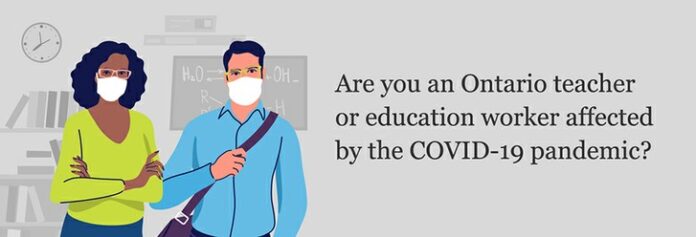The study asks what are the effects of the pandemic on teachers’ and education workers’ health?
As Ontario experiences a third wave of COVID-19, teachers and education workers are, once again, at the front lines of this pandemic. The Government of Canada, through the COVID-19 Immunity Task Force, is supporting a study to explore how Ontario’s teachers and education workers are being impacted by COVID -19. This study is being led by researchers from Sinai Health System and the University of Toronto. It will help inform decision-making around prevention strategies in elementary and secondary schools across Canada and the world. The study will also help evaluate the effectiveness of vaccines in this group of essential workers who will continue to be exposed to unvaccinated children. Finally, the study will evaluate the effects of the pandemic on education workers’ stress levels.
The Ontario study aims to enroll 7,000 education workers and will follow participants for 12 months. Participants will complete questionnaires about the risks they have faced and the protective measures they have taken. They will also be asked to give finger prick blood samples to establish whether they have had COVID-19 and how well they respond to vaccines. They will be told their test results. Participation is anonymous and no personal information will be shared outside the study.
“Finger prick blood tests are easy to do and an important part of our study,” explains Dr. Brenda Coleman, PhD, researcher at Sinai Health System and assistant professor at the University of Toronto. “They allow us to determine how many participants have already been exposed to the virus, how many become exposed during the study, and how well and for how long antibodies last after vaccination.”
“The pandemic has also imposed enormous stress on school personnel. Examples include feeling anxiety about the potential risk of SARS-CoV-2 infection, being responsible for ensuring compliance with infection control measures, and experiencing the disruption that the pandemic has had on their work and their workplace,” explains Dr. Robert Maunder, Head of Psychiatric Research at Sinai Health and professor in the Department of Psychiatry at the University of Toronto.
“To provide a full picture of the impact of COVID-19 on our education workers, we need participants from across the province, including those working in small rural schools as well as large urban ones,” says Dr. Allison McGeer, senior scientist at the Lunenfeld-Tanenbaum Research Institute, infectious disease physician at Sinai Health System, and professor at the University of Toronto. “We have over 2000 people taking part in the study now and hope to have the other 5000 by the end of May so we can provide preliminary results before schools open again in September”, she adds.
Everyone working in Ontario’s public and private elementary and secondary schools, including both teachers and all other education workers (e.g., consultants, teaching assistants, administrative staff, early childhood education workers, bus drivers, janitors, and principals) are welcome to join the study. To find out more, visit http://www.tibdn.ca/covid-19/education

